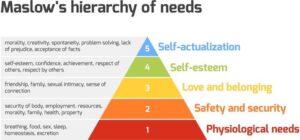We came into the field for various reasons, one of which is to make a difference. We’ve always been drawn to making a difference. Making a difference is in our DNA. It is our nature. Yet, how often do we stop and wonder, “what does it mean to make a difference.” As such, let us ask, together, this question: What does it mean to make a difference in our field of mental health, in particular, and in medicine, at large?
Associatively: What is that we would like to see for our patients and clients? And more importantly, what is it that they want? Looking at Maslow’s Hierarchy of Needs, we have a guideline to go by. As such, we can say that we would like our patients and clients have:
-
Physiological needs: Consisting of shelter, water, food, clothing, and warmth
-
Safety needs: including physical, psychological, financial, and social safety
-
Needs related to Love and belonging: Including social support
-
Needs related to Self-esteem: including having a sense of self that is stable, anchored, and which continues to grow and evolve
-
Needs related to Self-actualization: which is another way to say fulfillment
Looking at the above needs, many questions emerge:
-
Can this hierarchy be used to help determine whether we are making a difference or not, and if we are, how much of a difference we are making?
-
Suppose this hierarchy is viable in determining and measuring our practice. Could we make it more clinically driven and available so that clinicians can use and implement it in the most user-way possible?

It is regrettable to see how much more Maslow’s Hierarchy of Needs is being used in business than in clinical care. The question is, why? Why has such a powerful, practical, common-sense tool been adapted in the business industry and not in the field for which it was intended? Why are we measuring our patients’ and clients’ success by simply whether they take their medications or not, by simply whether they get hospitalized or not, as opposed to where they are in the Hierarchy of Needs, and as opposed to what is the plan to help them move to the next milestone?
We all came to this field to make a difference, but hardly any of us ever wonder what “making a difference” means; how do we operationalize it; how do we categorize it; and how do we measure it? This, of course, explains in large part the reason behind the high rate of burnout among us. We want to make a difference; We are doing our best to make a difference, but the results we are getting from our daily efforts and our sacrifices are sometimes hard even to quantify.
We can no longer wait and allow those with special interests, none of which include the interests of our patients, continue to make the decision for them. We can no longer stay on the sidelines. We have to do something, and while one person, alone, may not be able to do much, coming together, in community, we can.
Are you ready to join forces with a community of clinicians and make the difference for our patients and clients? If so, please join our SWEET Community for your CEUs, a transformational learning experience in an environment of like-minded people. A home and a place to grow.
We look forward to welcoming you soon,
Karen and Mardoche
About the Authors:
Karen Dubin-McKnight, PhD, LCSW, is a Columbia-trained Social Worker with wide clinical, teaching, and supervision experience. She also has a background in management, mentorship, and leadership that spans almost 20 years. Her added passion is in advocacy, coaching, public relations, and mediation. Her goal is to ensure that social workers and women feel empowered and have a voice “at the table.” She has previously held Executive level positions, and two other directorships in different organizations. She is currently Adjunct Faculty at Columbia University School of Social Work and Adelphi University School of Social Work. She also maintains a private practice, working with individuals who have experienced loss and trauma, and also provides clinical and management supervision.
Mardoche Sidor, MD is a Harvard-trained Quadruple Board Certified Psychiatrist, Assistant Professor of Psychiatry at Columbia University, School of Physicians and Surgeons. He is trained in and taught all the major psychotherapeutic modalities, including and not limiting to CBT, DBT, Family Systems, and Psychodynamic Psychotherapy. He is also the author of 3 books including Journey to Empowerment; Discovering Your Worth; and The Power of Faith. Dr. Sidor has worked both as a primary care physician and as Medical director in three different settings, including as Chief Medical Officer of Center for Alternative Sentencing and Employment Services (CASES). He is the Founder and CEO of the SWEET Institute.